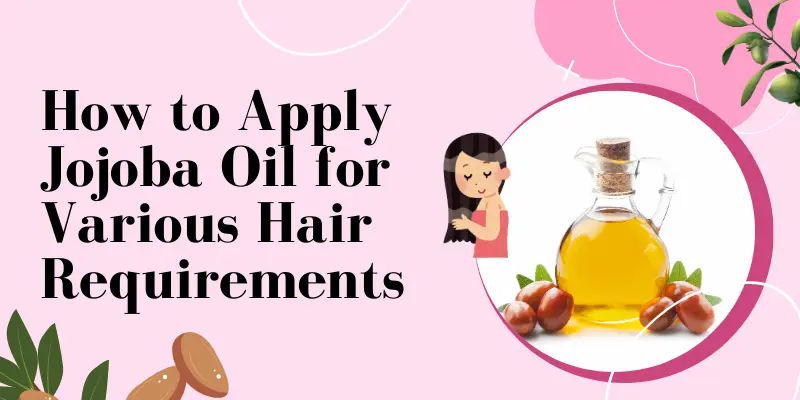Jojoba Hair Oil- A Complete Guide to Healthier, Balanced Hair
Published: 4 Jan 2025
In 2025, achieving luscious, balanced hair is simpler than ever with jojoba hair oil. Extracted from the seeds of the jojoba plant, this golden elixir closely mimics the scalp’s natural sebum, making it a versatile solution for various hair concerns. Whether you’re battling dryness, frizz, or an oily scalp, jojoba oil offers a lightweight, non-greasy remedy suitable for all hair types and ages. This comprehensive guide delves into the myriad benefits of jojoba oil, application methods tailored to specific needs, and personal experiences that highlight its transformative power.
Why Jojoba Oil is a Hair Care Game-Changer
Jojoba oil is a true multitasker in hair care, closely mimicking the natural oils your scalp produces, which makes it ideal for balancing oil production. Its deeply moisturizing properties help hydrate dry strands without leaving a greasy residue.

Packed with vitamins and antioxidants, it strengthens hair from root to tip, reducing breakage and split ends. Jojoba oil also soothes the scalp, helping to combat dandruff, itchiness, and inflammation. Whether used as a pre-wash treatment or leave-in serum, it adds shine, softness, and overall health to all types of hair.
Balances Scalp Oil Production
Jojoba oil’s composition is remarkably similar to human sebum, allowing it to regulate the scalp’s oil production effectively. This balance helps prevent both excessive dryness and greasiness, promoting a healthier scalp environment.
Deep Moisturization Without the Grease
Unlike heavier oils, jojoba oil penetrates the hair shaft, delivering moisture without leaving a greasy residue. This makes it ideal for fine or oily hair types that require hydration without added weight.
Soothes Dry Scalp and Reduces Dandruff
Rich in antibacterial and anti-inflammatory properties, jojoba oil alleviates dry, itchy scalps and combats dandruff, promoting overall scalp health.
Strengthens Hair and Prevents Breakage
By nourishing hair from within, jojoba oil enhances elasticity and strength, reducing breakage and split ends. Regular use can lead to visibly healthier strands.
Adds Shine and Softness
Sealing the hair cuticle, jojoba oil imparts a natural shine and softness, enhancing the overall appearance and feel of your hair.
How to Apply Jojoba Oil for Various Hair Requirements
For dry hair, warm a few drops of jojoba oil and massage it into your scalp and strands before shampooing. To control frizz and add shine, apply a small amount to damp ends as a leave-in.

For oily scalps, use it sparingly at the roots to balance sebum without clogging pores. Deep conditioning treatments can mix jojoba oil with other oils like coconut or argan to maximize argan oil benefits and provide enhanced nourishment.
Scalp Treatment for Oil Regulation
- Application: Massage a small amount of jojoba oil onto your scalp.
- Duration: Leave it on for 20–30 minutes before washing with a gentle shampoo.
- Frequency: Use 1–2 times a week for best results.
Leave-In Conditioner for Moisture and Shine
- Application: After washing, apply a few drops to the ends of damp hair.
- Benefit: Seals in moisture, adds shine, and reduces frizz without weighing hair down.
Dandruff Relief Blend
- Mix: Combine jojoba oil with a few drops of tea tree oil.
- Application: Massage into the scalp and leave for 30 minutes before rinsing.
- Benefit: Soothes the scalp and reduces flakiness.
Overnight Strengthening Treatment
- Mix: Apply rosemary oil by blending it with jojoba oil and a few drops of peppermint oil for a refreshing, scalp-stimulating treatment.
- Application: Apply to the lengths and ends of your hair before bed.
- Benefit: Strengthens hair and prevents breakage.
Who Can Benefit Most from Jojoba Oil
Jojoba oil is ideal for people with dry, damaged, frizzy, or oily hair, thanks to its lightweight, balancing nature. It’s especially beneficial for those with sensitive scalps or chemically treated hair seeking gentle, natural care.

- Oily or Combination Scalps: Balances sebum production.
- Fine Hair: Provides moisture without heaviness
- Dry, Flaky Scalps: Soothes irritation and reduces dandruff.
- Color-Treated or Damaged Hair: Nourishes and strengthens while preserving color.
Personal Experiences with Jojoba Oil
Here are some personal experiences:
Ayesha’s Journey to Frizz-Free Hair
After years of battling frizzy hair, I started using jojoba oil as a leave-in conditioner. Within weeks, my hair became noticeably smoother and more manageable. It’s now a staple in my hair care routine.
Sara’s Solution for an Oily Scalp
My scalp used to get greasy just a day after washing. Incorporating jojoba oil treatments twice a week has balanced my scalp’s oil production, allowing me to extend the time between washes.
Conclusion
Jojoba hair oil stands out as a natural, versatile solution for a wide range of hair concerns. Its ability to mimic natural sebum helps balance oil production, moisturize without greasiness, and improve overall hair health. Safe and suitable for all ages and hair types, jojoba oil is a must-have in any hair care routinemaking it a timeless go-to for strong, shiny, and radiant hair.
Jojoba Hair Oil FAQs
Yes, jojoba oil is very safe because it’s lightweight and non-greasy compared to heavier oils like castor or coconut. It absorbs quickly into the scalp without leaving a sticky residue. However, daily use isn’t always necessary; 2 to 3 times a week is usually enough to see results. Overuse may sometimes weigh hair down, especially for fine or thin textures.
Jojoba oil doesn’t directly speed up the growth rate of hair, but it plays a vital supporting role. It nourishes the scalp, balances oil production, and reduces dryness or dandruff, all of which create a healthy environment for hair to grow. Stronger, healthier roots naturally encourage better growth over time. Regular scalp massages with jojoba oil can also stimulate circulation, indirectly supporting hair health.
You can leave jojoba oil on your hair for 20–30 minutes before washing with shampoo for a nourishing pre-wash treatment. For extra hydration, some people prefer leaving a small amount as a leave-in conditioner without rinsing. If using it as a leave-in, apply only a few drops to the ends or scalp to avoid greasiness. Adjust the method based on your hair’s needs.
Absolutely! Jojoba oil is gentle and won’t strip or fade hair dye. Instead, it helps lock in moisture and maintain softness, which is especially useful for color-treated strands that are prone to dryness. Many stylists recommend lightweight oils like jojoba because they provide shine without dulling the vibrancy of dyed hair. It’s safe and effective for maintaining both color and health.
No, jojoba oil is unlikely to block hair follicles because its structure closely resembles natural scalp sebum. This allows it to penetrate deeply without causing buildup or clogging pores. In fact, it can help dissolve excess sebum, clearing follicles for healthier growth. Compared to thicker oils, it’s much gentler and safer for regular scalp use.
Jojoba oil works well on both damp and dry hair, depending on the purpose. For a pre-wash conditioning treatment, it’s best applied to dry hair so it can fully absorb before shampooing. For leave-in care, applying to towel-dried, damp hair helps lock in moisture and makes styling easier. You can experiment with both to see what suits your hair type.
Yes, jojoba oil can be very effective for dandruff. Its antibacterial and anti-inflammatory properties help soothe an irritated scalp and reduce flakiness. Regular use balances scalp moisture, preventing dryness that often leads to dandruff. For best results, massage it directly into the scalp and leave it on for at least 30 minutes before washing.
Yes, jojoba oil is versatile and works well for all hair textures, including straight, wavy, curly, and coily. It’s light enough for fine hair but still nourishing for thick or coarse strands. Its ability to balance scalp oil production makes it especially useful for people with oily or combination scalps. Everyone can benefit from its moisturizing and protective qualities.
Certainly! Jojoba oil blends beautifully with other oils to enhance its effects. Mixing it with tea tree oil can help combat dandruff, while rosemary oil may stimulate hair growth. Coconut oil or castor oil can also be combined with jojoba for deeper hydration. These combinations allow you to customize treatments to your hair’s specific needs.
No, jojoba oil has only a mild, slightly nutty aroma that fades quickly after application. It’s far less noticeable than stronger oils like castor or olive. Because the scent is so light, it won’t interfere with other hair products or perfumes you use. This makes it an excellent option for people who prefer fragrance-free or subtly scented hair care.

- Be Respectful
- Stay Relevant
- Stay Positive
- True Feedback
- Encourage Discussion
- Avoid Spamming
- No Fake News
- Don't Copy-Paste
- No Personal Attacks

- Be Respectful
- Stay Relevant
- Stay Positive
- True Feedback
- Encourage Discussion
- Avoid Spamming
- No Fake News
- Don't Copy-Paste
- No Personal Attacks





